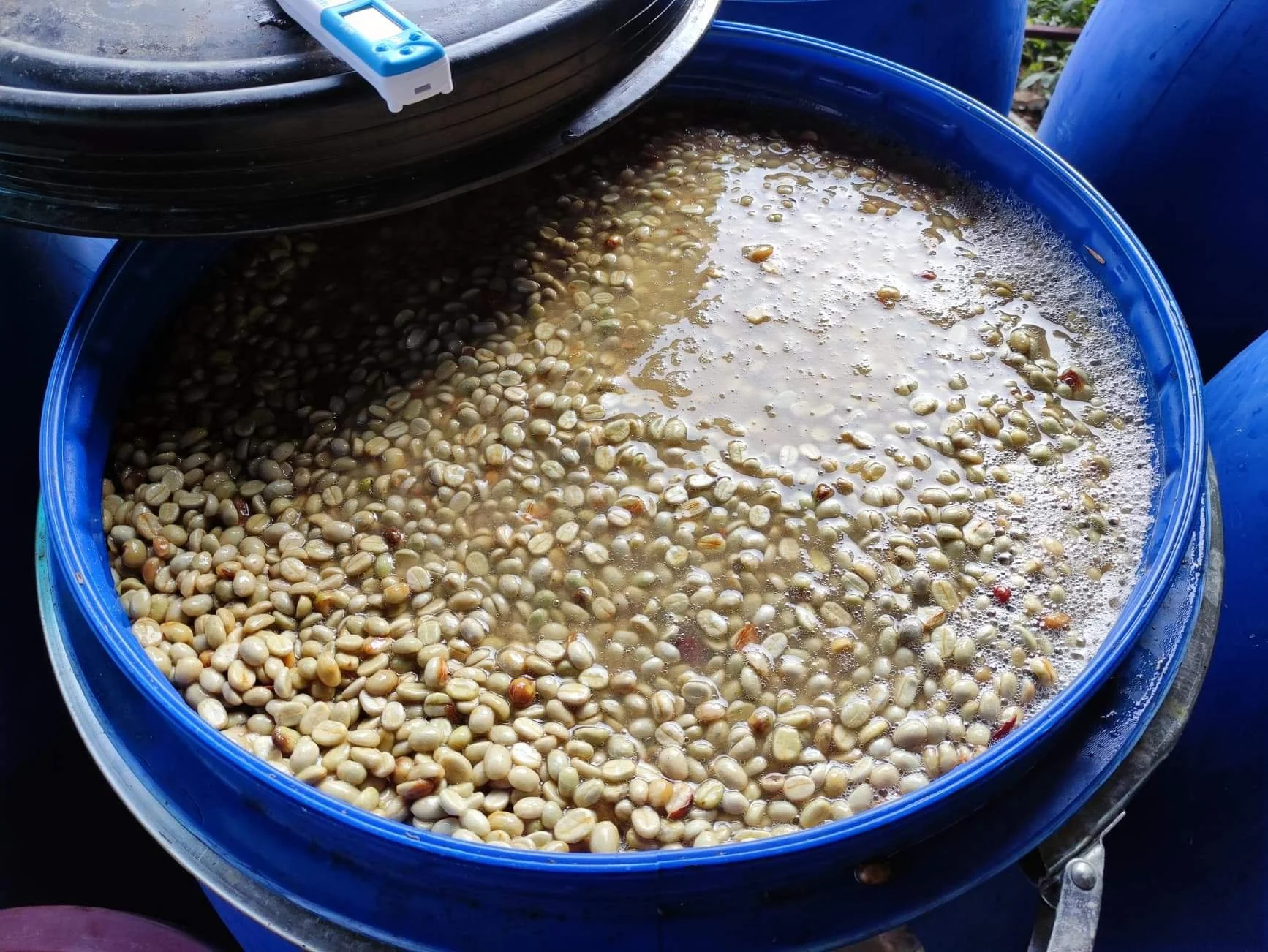Tamping the Craftsmanship
This special lot comes from Doi Saket in Chiang Mai, where we collaborate with the Intakad family. Nui and Aoy Intakad, a young couple, left their white-collar jobs in the city seven years ago to return to their parents' coffee farm. Nui, aged 38, is an engineer, while Aoy, aged 35, is an accountant.
Doi Saket is the oldest coffee-growing area in Thailand, located in Chiang Mai province. In the late 1970s, the first Arabica trees were introduced as part of the Thai King’s opium replacement program. Unlike many other regions, these trees have not been replaced by higher-yield cultivars, allowing heirloom varietals—particularly Typica—to remain prevalent on many old farms. The coffee trees, some aged 30–40 years, are often older than the farmers themselves!
The forest in Doi Saket is exceptionally well-preserved, providing full shade for the coffee trees. This lush environment, located just 45 minutes from Chiang Mai, benefits from strong forest preservation efforts, especially close to urban centers, where authorities can more easily monitor and prevent land encroachment. This proximity helps maintain the area's rich biodiversity, making it ideal for specialty coffee cultivation.
Chiang Mai, often called 'The Coffee Capital of Southeast Asia,' boasts a vibrant ecosystem of coffee producers, roasters, and cafés, all thriving in close proximity. By enjoying this cup, you are not just savoring exceptional coffee—you’re supporting a thriving coffee ecosystem.
The majority of Thai coffee is consumed domestically, reflecting the strength of local collaboration among small-scale coffee producers. Much of the expertise in farm management and processing has been co-developed by local roasters and baristas, fostering a culture of innovation and mutual growth. These passionate coffee communities are now proudly showcasing their extraordinary coffee on the global stage, sharing the results of their dedication and craftsmanship with the world.
CULTIVARS
Typica
ALTITUDE
1100 -1450 MASL
NOTABLE
Beanspire’s goal is to demonstrate that there is a market for heirloom cultivars. Customers are willing to pay a premium to compensate for the lower yield of these rare varietals. Typica is now exceedingly rare, as most farmers have replaced it with higher-yield, rust-resistant strains. The meticulous processing approach resulted in a much lower cherry-to-green-bean conversion ratio than usual. While the typical ratio is 15% (1:0.15), this lot had a conversion ratio of just 5% (1:0.05) due to the rigorous selection process.
PROCESSING
Anaerobic Natural : This lot was processed at the end of the harvest season when the weather is more stable. Ripe cherries were picked in the morning from Typica trees, and processing began immediately to avoid unwanted fermentation. Only fully ripe cherries were selected through careful hand-sorting. The cherries were floated in water to remove defective ones. The cherries were laid in a single layer on raised beds, ensuring minimal contact between them to allow even moisture distribution and prevent unwanted fermentation. Drying was conducted in a greenhouse under controlled conditions. The process was carefully monitored over three weeks, with defective cherries removed regularly until the moisture content reached 10%. The green coffee underwent thorough preparation, including destoning, hulling, size grading, and density table sorting, followed by hand-sorting. The beans passed through the density table multiple times to ensure uniformity. The coffee was packed in triple-layered bags for shipping: an outer cotton bag, a middle layer of High-Density Polyethylene (HDPE), and an innermost GrainPro bag to preserve freshness.
Anaerobic white Honey : In this white honey process, we aimed to preserve the cleanliness of a fully washed coffee while adding complexity. After the cherries were picked and delivered to our mill, they were floated and pulped at night. The coffee underwent partial anaerobic fermentation for 12 hours to remove some mucilage while leaving a thin layer of pectin intact. The beans were then dried on raised beds before being delivered to our dry mill for hulling and sorting. For green coffee preparation, the beans passed through a destoner, huller, size grader, and density table, followed by hand-sorting to ensure the highest quality.
Cupping notes
2024 HARVEST
-
The price you pay for Intakad family lot p/kg. We agreed on this price directly with the farmers, disregarding the volatile US Coffee C price.
-
The farm gate price includes the payment to farmers for the coffee, wet milling, and margin.
Doi Saket Typica Anaerobic Natural :€ 10,15
-
Beanspire collaborates with producers to mill their coffee, coordinate local freight from farm to port, and manage export paperwork, marketing and sales. The price break down also includes the cost of these services along with Beanspire's profit margin
Doi Saket Typica Anaerobic Natural : € 2,30
-
Shipping is arranged from Lat Krabang Inland Container Depot in Thailand to Rotterdam, Netherlands, with all logistics and paperwork managed by Beanspire.
-
Average financing cost owed to (mostly social) lenders. This ensures immediate payment to the farmers when the coffee leaves the farm or port.
-
A standard TSU premium on all coffees designated exclusively to accelerate farmers’ own regenerative agriculture projects.
-
This Side Up compensation for spending time and resources importing this coffee. Our work includes year-round contact with producers, managing export, shipping, import, warehousing, grading, sampling, finding and keeping roasting partners for Intakad family. € 1,65 is This Side Up’s Model 1 markup. For a full overview of our modular margin construction, see the Trade Models page.
PHOTO GALLERY
You may use them freely to promote the Intakad family (Doi Saket) among your customers.








































